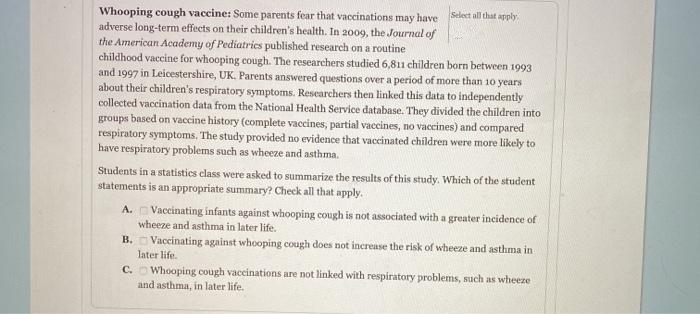Whooping cough vaccine: Some parents fear that vaccinations may have Select all that apply. adverse long-term effects on their children's health. In 2009, the Journal of the American Academy of Pediatrics published research on a routine childhood vaccine for whooping cough. The researchers studied 6,811 children born between 1993 and 1997 in Leicestershire, UK. Parents answered questions over a period of more than 10 years about their children's respiratory symptoms. Researchers then linked this data to independently collected vaccination data from the National Health Service database. They divided the children into groups based on vaccine history (complete vaccines, partial vaccines, no vaccines) and compared respiratory symptoms. The study provided no evidence that vaccinated children were more likely to have respiratory problems such as wheeze and asthma. Students in a statistics class were asked to summarize the results of this study. Which of the student statements is an appropriate summary? Check all that apply. A. Vaccinating infants against whooping cough is not associated with a greater incidence of wheeze and asthma in later life. B. Vaccinating against whooping cough does not increase the risk of wheeze and asthma in later life. c. Whooping cough vaccinations are not linked with respiratory problems, such as wheeze and asthma, in later life.
Whooping cough vaccine: Some parents fear that vaccinations may have Select all that apply. adverse long-term effects on their children's health. In 2009, the Journal of the American Academy of Pediatrics published research on a routine childhood vaccine for whooping cough. The researchers studied 6,811 children born between 1993 and 1997 in Leicestershire, UK. Parents answered questions over a period of more than 10 years about their children's respiratory symptoms. Researchers then linked this data to independently collected vaccination data from the National Health Service database. They divided the children into groups based on vaccine history (complete vaccines, partial vaccines, no vaccines) and compared respiratory symptoms. The study provided no evidence that vaccinated children were more likely to have respiratory problems such as wheeze and asthma. Students in a statistics class were asked to summarize the results of this study. Which of the student statements is an appropriate summary? Check all that apply. A. Vaccinating infants against whooping cough is not associated with a greater incidence of wheeze and asthma in later life. B. Vaccinating against whooping cough does not increase the risk of wheeze and asthma in later life. c. Whooping cough vaccinations are not linked with respiratory problems, such as wheeze and asthma, in later life.
Glencoe Algebra 1, Student Edition, 9780079039897, 0079039898, 2018
18th Edition
ISBN:9780079039897
Author:Carter
Publisher:Carter
Chapter10: Statistics
Section10.6: Summarizing Categorical Data
Problem 10CYU
Related questions
Question
Please do not give solution in image format thanku

Transcribed Image Text:Whooping cough vaccine: Some parents fear that vaccinations may have Select all that apply.
adverse long-term effects on their children's health. In 2009, the Journal of
the American Academy of Pediatrics published research on a routine
childhood vaccine for whooping cough. The researchers studied 6,811 children born between 1993
and 1997 in Leicestershire, UK. Parents answered questions over a period of more than 10 years
about their children's respiratory symptoms. Researchers then linked this data to independently
collected vaccination data from the National Health Service database. They divided the children into
groups based on vaccine history (complete vaccines, partial vaccines, no vaccines) and compared
respiratory symptoms. The study provided no evidence that vaccinated children were more likely to
have respiratory problems such as wheeze and asthma.
Students in a statistics class were asked to summarize the results of this study. Which of the student
statements is an appropriate summary? Check all that apply.
A. Vaccinating infants against whooping cough is not associated with a greater incidence of
wheeze and asthma in later life.
B. Vaccinating against whooping cough does not increase the risk of wheeze and asthma in
later life.
C. Whooping cough vaccinations are not linked with respiratory problems, such as wheeze
and asthma, in later life.
Expert Solution
This question has been solved!
Explore an expertly crafted, step-by-step solution for a thorough understanding of key concepts.
This is a popular solution!
Trending now
This is a popular solution!
Step by step
Solved in 3 steps

Recommended textbooks for you

Glencoe Algebra 1, Student Edition, 9780079039897…
Algebra
ISBN:
9780079039897
Author:
Carter
Publisher:
McGraw Hill

Holt Mcdougal Larson Pre-algebra: Student Edition…
Algebra
ISBN:
9780547587776
Author:
HOLT MCDOUGAL
Publisher:
HOLT MCDOUGAL

College Algebra (MindTap Course List)
Algebra
ISBN:
9781305652231
Author:
R. David Gustafson, Jeff Hughes
Publisher:
Cengage Learning

Glencoe Algebra 1, Student Edition, 9780079039897…
Algebra
ISBN:
9780079039897
Author:
Carter
Publisher:
McGraw Hill

Holt Mcdougal Larson Pre-algebra: Student Edition…
Algebra
ISBN:
9780547587776
Author:
HOLT MCDOUGAL
Publisher:
HOLT MCDOUGAL

College Algebra (MindTap Course List)
Algebra
ISBN:
9781305652231
Author:
R. David Gustafson, Jeff Hughes
Publisher:
Cengage Learning
